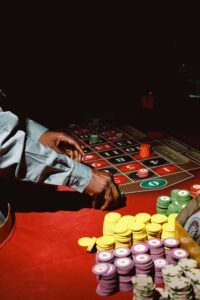The Life of a Professional Poker Player: Insights into the High-Stakes World


Poker is often seen as a game of chance, but it is an intricate blend of skill, strategy, and psychology for many. Professional poker players spend countless hours honing their craft, navigating the highs and lows of the game while maintaining an unwavering focus on their ultimate goal: success. This article explores the essential aspects of becoming a professional poker player, the strategies that fuel their success, and the challenges they face in this high-stakes world.
The Essential Skills of a Professional Poker Player
At the core of a professional poker player’s success lies a deep understanding of the game’s strategies and rules. While poker may seem straightforward initially, countless variablesered in every hand played. The best poker players understand the odds of winning based on their hole cards and the community cards on the table, and they can calculate pot odds to decide whether it’s worth continuing in the game. Knowledge of the game’s various formats, including Texas Hold’em, Omaha, and others, is fundamental in making informed decisions during gameplay.
However, technical knowledge alone is not enough. A professional poker player needs to master the psychological aspects of the game. This includes understanding their opponents, observing betting patterns, and detecting tells – subtle behavioral clues that reveal information about the strength of their hands. Reading people is critical for outsmarting other players and making better decisions. A skilled poker player can often predict an opponent’s actions based on their previous behavior, allowing them to take calculated risks that can pay off significantly.
Developing a Poker Strategy
One key element that separates professional poker players from amateurs is their approach to strategy. While luck may influence short-term outcomes, strategy and decision-making determine long-term success in poker. Professionals rely on various techniques, from tight-aggressive play (limiting losses by playing fewer hands and betting aggressively) to loose-aggressive play (playing a wider range of hands and being more unpredictable). Each strategy has its place, and players must adapt their tactics depending on the dynamics of the table and their opponents’ playing styles.
In addition to the basic strategies, a professional poker player must constantly refine their decision-making processes. This involves studying hands, reviewing losses, and analyzing situations to determine what went wrong or right. Many successful players use tools like solvers or equity calculators to assess their decisions and ensure they make the most optimal moves. Being able to adjust strategies based on different players, positions, and situations is an ongoing challenge for professionals and a crucial aspect of their success.
The Path to Becoming a Professional
Becoming a professional poker player is not an overnight success story. Most players start as amateurs, learning the ropes in low-stakes games or online poker rooms. Many professionals take the time to study the game extensively, reading books, watching videos, and discussing strategies with other players. The rise of online poker has made it easier for players to practice and compete against others, but it also means the competition is fierce. A successful player must be willing to work long hours to build a bankroll and develop the necessary skills to compete at a higher level.
As players progress, they enter live tournaments with higher stakes and more intense competition. While it’s possible to make a career playing online, many professional poker players transition to live events, such as the World Series of Poker (WSOP), where large prize pools and global recognition await those who succeed. In these tournaments, players must be technically proficient and adept at handling the pressure of large audiences, cameras, and the psychological warfare that comes with playing against the best in the world.
Challenges Faced by Professional Poker Players
Despite the potential for high rewards, the life of a professional poker player is fraught with challenges. One of the most difficult aspects of this career is managing the inevitable losing streak. Even the most successful players experience downswings, where bad luck or poor decisions can lead to substantial losses. Bankroll management is critical in navigating these periods of uncertainty, and professionals must be disciplined enough to know when to walk away from the table and avoid chasing losses.
Another major challenge is the mental and emotional toll of the profession. Poker is a game of high pressure, and prolonged periods of stress can lead to burnout. Players must learn how to manage their emotions, keep calm under pressure, and avoid tilt – a term for the frustration that leads to poor decisions. Many professional players rely on mental coaching, meditation, and physical exercise to maintain focus and reduce stress. The ability to remain emotionally stable during the game is as important as the technical skills required to succeed.
The Rewards of Professional Poker
For those who can master the game, the rewards of being a professional poker player can be immense. The most obvious reward is the potential for significant financial gain. Major poker tournaments offer millions of dollars in prize money, and a thriving player can accumulate wealth through consistent tournament wins or cash games. Beyond money, professional poker players also gain fame and recognition within the poker community. Many top players have become celebrities in their own right, with sponsorships, endorsements, and opportunities to share their expertise through streaming or coaching.
However, the rewards come with sacrifices. Professional poker players spend long hours at the table, traveling for tournaments, and constantly working on their skills. The lifestyle can be demanding, and income instability can make it a less appealing career choice for some. Despite these challenges, the excitement of the game, the potential for big wins, and the freedom of being your boss are strong incentives for many to pursue poker as a full-time career.
Becoming a professional poker player is not for the faint of heart. It requires a combination of skill, strategy, emotional resilience, and a willingness to embrace the game’s highs and lows. While the rewards can be great, the challenges are significant, and the path to success requires years of practice, learning, and adapting to an ever-evolving game. For those who have the drive and determination, however, poker offers the potential for a thrilling and rewarding career, where every hand dealt is another opportunity to prove themselves.

